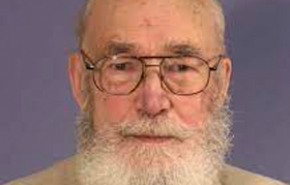Byeong Park
Byeong Uk Park is a South Korean statistician working in structured nonparametric regression, semiparametric inference and non-Euclidean data analysis.
Pedro Luis do Nascimento Silva
Principal researcher at the National School of Statistical Sciences, and former President of the International Statistical Institute.
Marcel de Toledo Vieira
Marcel de Toledo Vieira, born in 1976 and winner of the 2007 Cochran-Hansen Prize of the International Association of Survey Statisticians (IASS), is currently Associate Professor of Statistics, at the Department of Statistics of the Federal University of Juiz de Fora, in Brazil.
He has been a member of the IASS since 2007 (Council Member between 2011 and 2015) and was elected Member of the International Statistical Institute in 2013.

The inaugural Karl Pearson Prize was awarded for their monograph Generalized Linear Models (1983).
This book has changed forever teaching, research and practice in statistics. It provides a unified and self-contained treatment of linear models for analyzing continuous, binary, count, categorical, survival, and other types of data, and illustrates the methods on applications from different areas. The monograph is based on several groundbreaking papers, including “Generalized linear models,” by Nelder and Wedderburn, JRSS-A (1972), “Quasi-likelihood functions, generalized linear models, and the Gauss-Newton method,” by Wedderburn, Biometrika (1974), and “Regression models for ordinal data,” by P. McCullagh, JRSS-B (1980). The implementation of GLM was greatly facilitated by the development of GLIM, the interactive statistical package, by Baker and Nelder. In his review of the GLIM3 release and its manual in JASA 1979 (pp. 934-5), Peter McCullagh wrote that “It is surprising that such a powerful and unifying tool should not have achieved greater popularity after six or more years of existence.” The collaboration between McCullagh and Nelder has certainly remedied this issue and has resulted in a superb treatment of the subject that is accessible to researchers, graduate students, and practitioners.
The prize was presented on 27 August 2013 at the ISI World Statistics Congress in Hong Kong, and was followed by the Karl Pearson Lecture by Peter McCullagh.
[1] John Nelder passed away in August 2010.

The inaugural Karl Pearson Prize was awarded for their monograph Generalized Linear Models (1983).
This book has changed forever teaching, research and practice in statistics. It provides a unified and self-contained treatment of linear models for analyzing continuous, binary, count, categorical, survival, and other types of data, and illustrates the methods on applications from different areas. The monograph is based on several groundbreaking papers, including “Generalized linear models,” by Nelder and Wedderburn, JRSS-A (1972), “Quasi-likelihood functions, generalized linear models, and the Gauss-Newton method,” by Wedderburn, Biometrika (1974), and “Regression models for ordinal data,” by P. McCullagh, JRSS-B (1980). The implementation of GLM was greatly facilitated by the development of GLIM, the interactive statistical package, by Baker and Nelder. In his review of the GLIM3 release and its manual in JASA 1979 (pp. 934-5), Peter McCullagh wrote that “It is surprising that such a powerful and unifying tool should not have achieved greater popularity after six or more years of existence.” The collaboration between McCullagh and Nelder has certainly remedied this issue and has resulted in a superb treatment of the subject that is accessible to researchers, graduate students, and practitioners.
The prize was presented on 27 August 2013 at the ISI World Statistics Congress in Hong Kong, and was followed by the Karl Pearson Lecture by Peter McCullagh.

The prize was awarded for their paper “Longitudinal data analysis using generalized linear models” published in Biometrika (1986).
This paper had an immediate and sustained impact on both theory and methodology in statistics and biostatistics, as well as on applications in medical, physical and social sciences. In the early 1980’s, inference using generalized linear models was enabling regression methods to be quickly adapted to models and data with non-normal responses. At the same time the collection of repeated measurements on the same individual was a prominent feature of work in social sciences, medicine, public health, and other areas of science. Liang and Zeger showed how to adapt the generalized linear models framework to these settings, using methodology they proposed under the name generalized estimating equations (GEE). This methodology is now a staple component of applied statistics courses, of statistical computing packages, and of hundreds upon hundreds of analyses in diverse subject matter fields. The theoretical basis for the approach has been refined, and extended, to encompass a wide range of models with complex dependencies. The paper was included in the 1997 volume of Breakthroughs in Statistics, accompanied by a comprehensive overview by Peter Diggle.
The prize was presented on 31 July 2015 at the ISI World Statistics Congress in Rio de Janeiro, and was followed by the Karl Pearson Lecture by Scott Zeger.

The prize was awarded for their paper “Longitudinal data analysis using generalized linear models” published in Biometrika (1986).
This paper had an immediate and sustained impact on both theory and methodology in statistics and biostatistics, as well as on applications in medical, physical and social sciences. In the early 1980’s, inference using generalized linear models was enabling regression methods to be quickly adapted to models and data with non-normal responses. At the same time the collection of repeated measurements on the same individual was a prominent feature of work in social sciences, medicine, public health, and other areas of science. Liang and Zeger showed how to adapt the generalized linear models framework to these settings, using methodology they proposed under the name generalized estimating equations (GEE). This methodology is now a staple component of applied statistics courses, of statistical computing packages, and of hundreds upon hundreds of analyses in diverse subject matter fields. The theoretical basis for the approach has been refined, and extended, to encompass a wide range of models with complex dependencies. The paper was included in the 1997 volume of Breakthroughs in Statistics, accompanied by a comprehensive overview by Peter Diggle.
The prize was presented on 31 July 2015 at the ISI World Statistics Congress in Rio de Janeiro, and was followed by the Karl Pearson Lecture by Scott Zeger.

